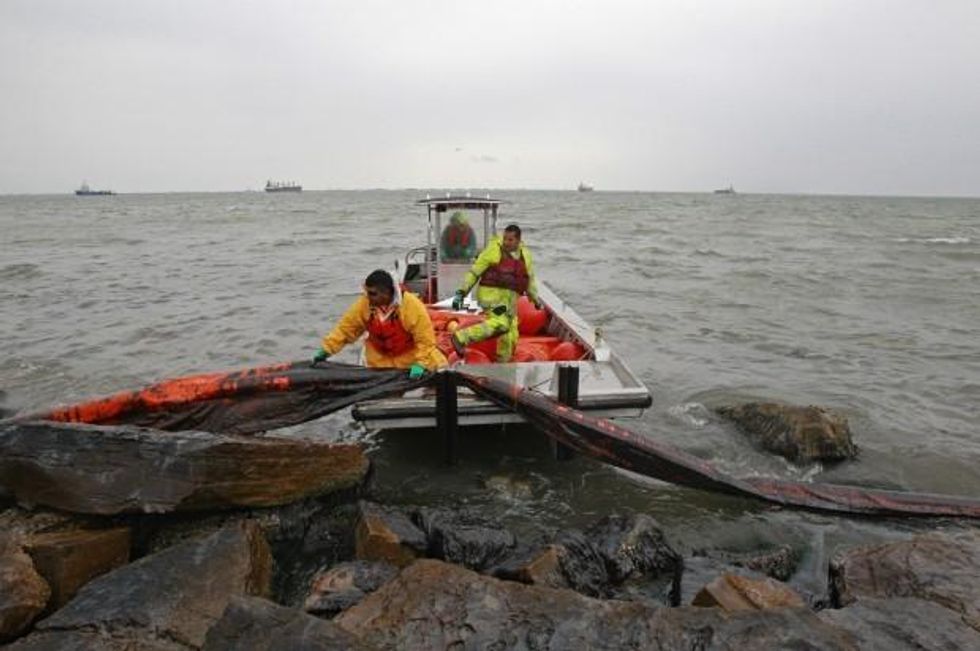Heavy Crude Spill Hits Direct Path of Migrating Birds
Barge collision sends over 168,000 gallons of oil into busy shipping channel

The barge, which was being towed from Texas City to Bolivar, was carrying nearly one million gallons of RMG 380, an especially thick oil that officials warn has long-lasting environmental impacts.
One of the barge's tanks was breached, spilling up to 168,000 gallons (4,000 barrels) of oil into the Galveston Bay, according to estimates from the U.S. Coast Guard.
The spill comes 25 years after the Exxon oil spill in Valdez, Alaska and nearly four years after BP's Deepwater Horizon spill in the Gulf of Mexico.
While the size of Saturday's spill is smaller than those disasters, it took place in the direct path of a bird migration path. Clean-up officials and environmental groups report oiled and dead birds.
"I've heard this is the largest spill in 25 years in Galveston Bay," said Rachel Powers, Executive Director for Citizens Environmental Coalition. "It happened right near a huge recreational fishing area that's an important source of local jobs."
"The timing really couldn't be much worse since we're approaching the peak shorebird migration season," said Richard Gibbons, conservation director of the Houston Audubon Society, in an interview with the Associated Press.
The Houston Ship Channel, described by ABC News as "one of the world's busiest waterways for moving petrochemicals," remained partially closed Monday as the clean-up effort continued.
As of Sunday, oil had been detected 12 miles off-shore in the Gulf of Mexico.
_____________________
An Urgent Message From Our Co-Founder
Dear Common Dreams reader, The U.S. is on a fast track to authoritarianism like nothing I've ever seen. Meanwhile, corporate news outlets are utterly capitulating to Trump, twisting their coverage to avoid drawing his ire while lining up to stuff cash in his pockets. That's why I believe that Common Dreams is doing the best and most consequential reporting that we've ever done. Our small but mighty team is a progressive reporting powerhouse, covering the news every day that the corporate media never will. Our mission has always been simple: To inform. To inspire. And to ignite change for the common good. Now here's the key piece that I want all our readers to understand: None of this would be possible without your financial support. That's not just some fundraising cliche. It's the absolute and literal truth. We don't accept corporate advertising and never will. We don't have a paywall because we don't think people should be blocked from critical news based on their ability to pay. Everything we do is funded by the donations of readers like you. Will you donate now to help power the nonprofit, independent reporting of Common Dreams? Thank you for being a vital member of our community. Together, we can keep independent journalism alive when it’s needed most. - Craig Brown, Co-founder |

The barge, which was being towed from Texas City to Bolivar, was carrying nearly one million gallons of RMG 380, an especially thick oil that officials warn has long-lasting environmental impacts.
One of the barge's tanks was breached, spilling up to 168,000 gallons (4,000 barrels) of oil into the Galveston Bay, according to estimates from the U.S. Coast Guard.
The spill comes 25 years after the Exxon oil spill in Valdez, Alaska and nearly four years after BP's Deepwater Horizon spill in the Gulf of Mexico.
While the size of Saturday's spill is smaller than those disasters, it took place in the direct path of a bird migration path. Clean-up officials and environmental groups report oiled and dead birds.
"I've heard this is the largest spill in 25 years in Galveston Bay," said Rachel Powers, Executive Director for Citizens Environmental Coalition. "It happened right near a huge recreational fishing area that's an important source of local jobs."
"The timing really couldn't be much worse since we're approaching the peak shorebird migration season," said Richard Gibbons, conservation director of the Houston Audubon Society, in an interview with the Associated Press.
The Houston Ship Channel, described by ABC News as "one of the world's busiest waterways for moving petrochemicals," remained partially closed Monday as the clean-up effort continued.
As of Sunday, oil had been detected 12 miles off-shore in the Gulf of Mexico.
_____________________

The barge, which was being towed from Texas City to Bolivar, was carrying nearly one million gallons of RMG 380, an especially thick oil that officials warn has long-lasting environmental impacts.
One of the barge's tanks was breached, spilling up to 168,000 gallons (4,000 barrels) of oil into the Galveston Bay, according to estimates from the U.S. Coast Guard.
The spill comes 25 years after the Exxon oil spill in Valdez, Alaska and nearly four years after BP's Deepwater Horizon spill in the Gulf of Mexico.
While the size of Saturday's spill is smaller than those disasters, it took place in the direct path of a bird migration path. Clean-up officials and environmental groups report oiled and dead birds.
"I've heard this is the largest spill in 25 years in Galveston Bay," said Rachel Powers, Executive Director for Citizens Environmental Coalition. "It happened right near a huge recreational fishing area that's an important source of local jobs."
"The timing really couldn't be much worse since we're approaching the peak shorebird migration season," said Richard Gibbons, conservation director of the Houston Audubon Society, in an interview with the Associated Press.
The Houston Ship Channel, described by ABC News as "one of the world's busiest waterways for moving petrochemicals," remained partially closed Monday as the clean-up effort continued.
As of Sunday, oil had been detected 12 miles off-shore in the Gulf of Mexico.
_____________________

